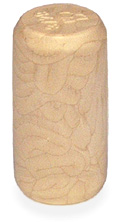Synthetic corks are a far more effective way to seal a wine bottle than just your ordinary natural wine cork stopper. There is not much question to this fact. Pretty much everyone in the wine making industry agrees with this statement.
In fact, synthetic corks can be thought of as sealing a wine bottle just as air-tight as a screw cap. If you’ve ever sealed a wine bottle with one, then you already know. You can tell just by looking that no air is getting past a synthetic cork.
But the real issue here is not how well synthetic corks or natural corks seal a wine bottle, but rather, which one will age the particular wine you are bottling in the most appropriate way. A perfect seal is not always the best option.
For some wines to age to their fullest potential they need air but at a very, very slow rate over a very, very long period of time. A natural cork stopper does this to varying degrees depending on the density of the cork. Air will seep through it.
Big wines that are full and rich such as a Cabernet tend to need some transfer of oxygen through the cork to become its best over time. With these wines you are better off using a high grade natural cork such as our extra first grade corks rather than using synthetic corks.
Wines that require some aging, but have a fruitiness as some of its character, will usually need less air to transfer through the cork. An example of this would be a California style Sauvignon Blanc. With these wines synthetic corks may be your best option.
———————————————————————————————————
Ed Kraus is a 3rd generation home brewer/winemaker and has been an owner of E. C. Kraus since 1999. He has been helping individuals make better wine and beer for over 25 years.
